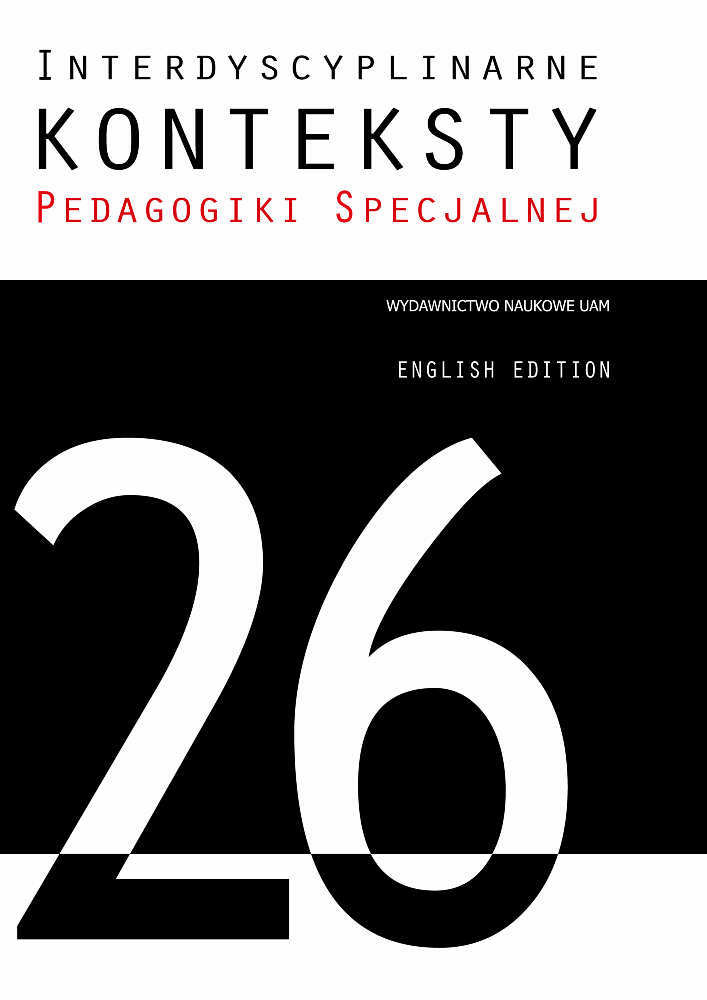Abstrakt
Edyta Zierkiewicz, Beata Cytowska, Doing and undoing gender by women with intellectual disabilities. Interdisciplinary Contexts of Special Pedagogy, no. 26, Poznań 2019. Pp. 271–293. Adam Mickiewicz University Press. ISSN 2300-391X. e-ISSN 2658-283X. DOI: https://doi.org/10.14746/ikps.2019.26.13
The aim of this article is to present socio-cultural processes of doing gender categories in women with intellectual disabilities and to identify barriers and limitations which they face on the way of „becoming women”. The study and its analysis are based on the critical approach. The method of data collection was a participant observation conducted during three proprietary workshops on femininity organized for 17 women with moderate to severe intellectual disabilities (5–6 people in a group), attending an occupational therapy workshop. The aim of our workshops was the empowerment of one’s own femininity and strengthening of processes of doing gender by the participants. The analysis of collected material revealed that the process of shaping gender identities of women with intellectual disability is a subject of social control of the local community. Participants of the workshops are well aware that they are adult women and they strive for the realization of cultural patterns of femininity. In their case, however, these patterns are socially regulated and the women themselves internalize certain limitations imposed by the society during the socialization process. They instinctively “know” what they are allowed to do, and what they cannot gain as women with intellectual disabilities.
Bibliografia
Butler J., Uwikłani w płeć. Feminizm i polityka tożsamości, transl. K. Krasuska, Krytyka Polityczna, Warsaw 2008.
Connell R., Advancing Gender Reform in Large-scale Organizations: A New Approach for Practitioners and Researchers, “Policy and Society” 2005, no. 24(4), pp. 5–24.
Connell R., Socjologia płci. Płeć w ujęciu globalnym, transl. O. Siara, PWN, Warsaw 2013.
Cytowska B., Zierkiewicz E., Conversations about health – sharing the personal experiences of women with intellectual disabilities, “Journal of Applied Research in Intellectual Disabilities”, 2020, DOI: 10.1111/jar.12718.
Cytowska B., Trudne drogi adaptacji. Wątki emancypacyjne w analizie sytuacji dorosłych osób z niepełnosprawnością intelektualną we współczesnym społeczeństwie polskim, Oficyna Wydawnicza „Impuls”, Kraków 2012.
Erikson E., Tożsamość a cykl życia, transl. M. Żywicki, Zysk i S-ka, Poznan 2004.
Gajewska G., Maskarada płci, czyli nie-kobieta udająca kobietę, “Miscellanea Anthropologica et Sociologica” 2017, no. 18(2), pp. 53–64.
Huppatz K., Reworking Bourdieu’s ‘Capital’: Feminine and Female Capitals in the Field of Paid Caring Work, “Sociology” 2009, no. 43(1), pp. 45–66.
Kimmel M., Społeczeństwo genderowe, transl. Anna Kłonkowska, Gdańskie Wydawnictwo Pedagogiczne, Gdansk 2015.
Lorber J., Believing is Seeing: Biology as Ideology, “Gender and Society” 1993, no. 7(4), pp. 568–581.
Martin E., Jajo i plemnik. Naukowy romans, transl. J. Włodarczyk, [in:] Gender. Perspektywa antropologiczna, ed. R. Hryciuk, A. Kościańska, V. 2, Warsaw 2007, pp. 33–49.
Piaget J., Inhelder B., Psychologia dziecka, transl. Z. Zakrzewska, Siedmioróg, Wroclaw 1996.
West C., Zimmerman D.H., Doing Gender, “Gender and Society” 1987, no. 1(2), pp. 125–151.
